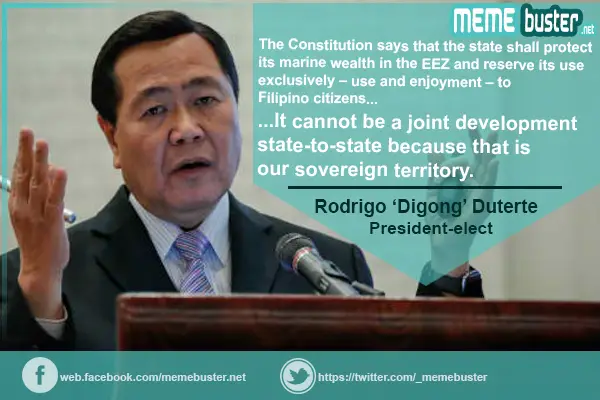On July 8, Foreign Affairs Secretary Perfecto Yasay was reported by Agence France Presse (AFP) to have said that the Philippines is willing to enter into a joint exploration of the natural resources in the disputed South China Sea with Beijing, even if it wins the case against China.
But on July 9, Yasay clarified this, saying that the AFP misquoted him.
“What I said is we have to wait for the ruling and study and dissect its implications,” Yasay told the GMA News Online via text message.
He further explained his answer by saying, “It is possible that some time in the future, claimant countries might consider entering into arrangements such as joint exploration and utilization of resources in disputed areas that do not prejudice the parties’ claims and delimitation of boundaries in accordance with UNCLOS (United Nations Convention on the Law of the Sea).”
On July 12, the ruling from the Permanent Court of Arbitration at The Hague was released and the Philippines won against China.
[ads1]
Yasay released and read a statement a few moments after The Hague verdict came out, welcoming the decision, but calling for ‘restraint and sobriety’ as experts study the ruling and its implications.
As for the interpretation of the ruling, Presidential Communications Secretary Martin Andanar said, “The Solicitor General [Jose Calida] shall provide the President a synopsis of the ruling tomorrow morning (July 13), and a complete and thorough interpretation in 5 days.”
While Yasay’s earlier statement about opened the possibility of sharing natural resources with China, Supreme Court Senior Associate Justice Antonio Carpio said it is not possible, based on the Constitution that prohibits the Duterte administration, or any administration at that, from signing a joint development with another state.
Carpio told ANC Headstart’s Karen Davila on Thursday, July 14, that the government is obliged to protect its exclusive economic zone, as mandated by the Constitution.

“The Constitution says that the state shall protect its marine wealth in the EEZ and reserve its use exclusively – use and enjoyment – to Filipino citizens,” Carpio said.
He also said that the PCA has already granted the 381,000 sq. km. of sea space in the West Philippine Sea to Manila and that “there are no overlapping EEZ from China.”
“It cannot be a joint development state-to-state because that is our sovereign territory,” Carpio said, although he noted that the Philippines can hire foreign companies to drill and will be compensated for their service.
On the issue of enforcing The Hague ruling, Carpio said naval powers can help.
As for China’s rejection of the PCA’s ruling, Carpio said that he is still optimistic that they will still abide by the international tribunal’s verdict, although it may take time as they prepare their people to accept the ruling that China no longer owns the maritime space within the nine-dash line. A map with the nine-dash line was taught in Chinese schools.
Carpio also touched on the issue of the Reed Bank, which is being eyed as the alternative source of energy once Malampaya runs out of supply in about ten years.
He said that the PCA ruling also said that Reed Bank is still within Philippine territory, so survey ships sent to the area should not be harassed anymore.
There should always be open communication between China and the Philippines and consultation with other ASEAN countries affected by the nine-dash line, according to Carpio.
As what Malacañang has promised earlier, Duterte will put the national interest as his priority when deciding about the Philippines’ next move concerning the West Philippine Sea. And it should be even more so with respect to the mandate of the Philippine Constitution. Just like what former President said Benigno Aquino III during his second SONA about the maritime dispute in the west Philippine Sea, “What’s ours is ours.”
[ads3]


